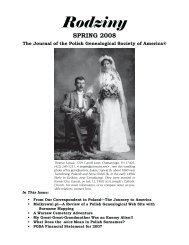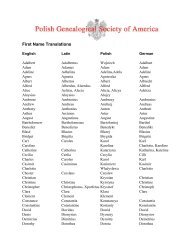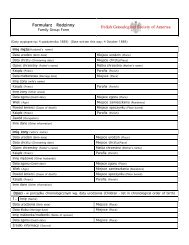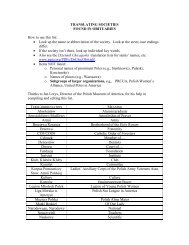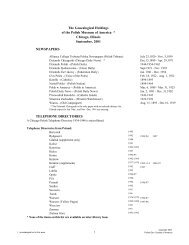A Crash Course in Polish: Words You Can Use
A Crash Course in Polish: Words You Can Use
A Crash Course in Polish: Words You Can Use
You also want an ePaper? Increase the reach of your titles
YUMPU automatically turns print PDFs into web optimized ePapers that Google loves.
tered when deal<strong>in</strong>g with the common place name end<strong>in</strong>g –ów: Kraków→ w Krakowie,<br />
Chrzanów → w Chrzanowie<br />
Other possibilities, less frequently encountered, are a ∼ e , ą ∼ ę, and ó/o ∼ e:<br />
a ∼ e:<br />
ą ∼ ę:<br />
ó/o ∼ e:<br />
Wierzchlas → w Wierzchlesie<br />
mąż → o mężu<br />
kościół → w kościele or jezioro → o jezierze<br />
Consonant Alternations<br />
Besides deal<strong>in</strong>g with remov<strong>in</strong>g end<strong>in</strong>gs and substitut<strong>in</strong>g others, researchers also need to be<br />
aware of consonant alternations <strong>in</strong> the stems of nouns when certa<strong>in</strong> end<strong>in</strong>gs are attached, especially<br />
<strong>in</strong> the locative s<strong>in</strong>gular case. Thus after prepositions such as w and na (among others) that<br />
<strong>in</strong>dicate a location or status <strong>in</strong> which someth<strong>in</strong>g is tak<strong>in</strong>g place (as opposed to change of location<br />
or status), nouns have locative case end<strong>in</strong>gs. Researchers need to recognize this because the phonetic<br />
shape of place names <strong>in</strong> documents may need to be altered one more time, even after the<br />
end<strong>in</strong>gs are removed, to arrive at the form of a place name given on a map or <strong>in</strong> a gazetteer. The<br />
most common of these alternations are:<br />
Map name Name <strong>in</strong> Locative<br />
ch → sz Birwicha → w Birwisze<br />
d → dzi Piwoda → w Piwodzie<br />
g → dz Praga → w Pradze<br />
k → c Adamówka → w Adamówce<br />
ł → l Piła → w Pile<br />
r → rz Wara → w Warze<br />
sł → śl Jasło → w Jaśle<br />
sn → śni Krosno → w Krośnie<br />
st → ście Nowe Miasto → w Nowym Mieście<br />
t → ci Huta → w Hucie<br />
zd → ździ Gniazdo → w Gnieździe (note the a → e vowel change)<br />
zn → źni Pilzno → w Pilźnie<br />
EXPRESSIONS OF TIME AND DATES<br />
The follow<strong>in</strong>g expressions, denot<strong>in</strong>g parts of the day and the like, immediately follow the<br />
hour:<br />
po północy — after midnight<br />
po południu — after noon<br />
przed północą — before midnight<br />
przed południem — before noon<br />
rano — morn<strong>in</strong>g<br />
wieczorem — <strong>in</strong> the even<strong>in</strong>g<br />
w nocy — at night<br />
o północy — at midnight<br />
w południu — at noon<br />
So o godz<strong>in</strong>ie trzeciej po południu is literally “at the 3rd hour after midday,” <strong>in</strong> other words, “at 3<br />
p.m.” Record keepers sometimes chose different styles to express the same thought, so that you<br />
may see o piątej godz<strong>in</strong>ie rano, “at five o’clock <strong>in</strong> the morn<strong>in</strong>g,” or o piątej godz<strong>in</strong>ie po północy,<br />
“at five o’clock after midnight,” to designate 5 a.m.<br />
Hoffman – A <strong>Crash</strong> <strong>Course</strong> <strong>in</strong> <strong>Polish</strong>: <strong>Words</strong> <strong>You</strong> <strong>Can</strong> <strong>Use</strong> – 4



